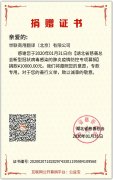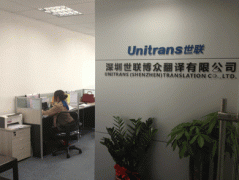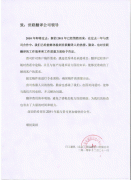世联翻译公司 金融英语阅读
时间:2016-11-23 16:47 来源:未知 作者:dl 点击:次
金融英语阅读 1 :“The Market”Is aConcept
世联翻译-让世界自由沟通!专业的全球语言翻译供应商,上海翻译公司专业品牌。丝路沿线56种语言一站式翻译与技术解决方案,专业英语翻译、日语翻译等文档翻译、同传口译、视频翻译、出国外派服务,加速您的全球交付。
世联翻译公司在北京、上海、深圳等国际交往城市设有翻译基地,业务覆盖全国城市。每天有近百万字节的信息和贸易通过世联走向全球!积累了大量政商用户数据,翻译人才库数据,多语种语料库大数据。世联品牌和服务品质已得到政务防务和国际组织、跨国公司和大中型企业等近万用户的认可。Is the market a place? Or a thing? Neither, really. It's a concept. If you are growing tomatoes in your backyard for sale, you are producing for the market. You might sell some to your neighbor and some in your little stand by the roadside and some to the manager of the local supermarket. But in either case, you are producing for the market. Your efforts are being directed by the market. If people stop buying tomatoes, you will stop producing them. If you mow lawns to earn money, you are producing a service for the market. If your father a steelworker or a bricklayer or a truck driver or a dentist or a grocer, he is producing goods or services for the market. 市场是一个地方吗?是一样东西吗?都不是,真的。市场是一个概念。如果你在自家的后院种番茄出售,你是在给市场提供产品。你可以将一些蔬菜卖给邻居,将一些蔬菜摆在路边的小摊上出售,将一些蔬菜卖给当地超级市场的经理,在任何一种情况下,你都是在给市场提供产品。你的努力都是在市场的引导下作出的。如果人们不买你的番茄,你就不会种番茄。如果你割草挣钱,你是在为市场提供劳务。如果你父亲是钢铁工人,或者是瓦匠,或者是卡车司机,或者是牙医,或者是开食品杂货店的,他也正在给市场提供商品或者劳务。 When you spend your income, you are buying things from the market. You may spend money in stores, supermarkets, gas stations, and restaurants. Still you are buying from the market. When the local grocer hires you to drive the delivery truck, he is buying your labor in the labor market. 当你花钱时,你是在市场上购买东西。你可以在商店、超级市场、气站和餐馆花钱,你还是在市场上购买东西。当本地的杂货店雇你开送货车,他是在劳动力市场上购买你的劳动。 The market may seem to be a fuzzy sort of thing. But for each person(or business) who is making and selling something, it's very real. If nobody buys your tomatoes, it won't be long before you get the message. The market is telling you something. It's telling you that you are using your energies and resources in doing something the market doesn't want you to do. 市场似乎是一种含糊不清的东西,但是,对一个正在生产商品的人(或一家企业),它是实实在在的。如果谁也不买你的番茄,不需要很长时间你就会得到信息。市场在告诉你一些道理,他在对你说,你做事所花的精力和使用的资源是市场上所不需要的。 金融英语阅读 2 :The Money in a Bank The banks are commercial enterprises and like many other businesses are organized as companies which are owned by shareholders. These shareholders, or their predecessors, provided the money to set up the banks and to enlarge them. This money is known as a bank’s capital. But the shareholders' money is only a small part of the total amount of money which the clearing banks have at their command. Who provided the rest of this enormous sum? The banks' customers. Banks, in effect, borrow from their customers as well as lend to them. 银行是商业企业,它的组织结构和其它企业一样,是由股东共同拥有的公司型组织。这些股东,或者是公司创始人,提供资金设立银行,并扩大资金规模。这笔资金被称为银行的资本金。但是,股东的资金仅仅是资金总额中的一小部分,并由清算银行控制。其余的大量资金由谁来提供呢?由银行的客户来提供。实际上,银行从客户那里借来资金,并向他们提供贷款。 The money which a bank obtains from its customers is generally known as its “deposits” and represents the balances which customers keep on their accounts with their banks. These accounts are of two main kinds: current accounts on which customers can draw cheques but receive no interest, and deposit and savings accounts on which the banks pay interest for the use of the money. 银行从其客户那里得到的钱,一般被称为“存款”,代表客户在银行账户上持有的余额。这些账户主要有两种:一种是活期存款,客户可以对其开出支票,但没有利息,另一种是储蓄存款账户,银行使用账上的资金要支付利息。 Many people --private individuals, manufacturers, traders, companies and official bodies --choose to keep part of heir resources in the form of money. They need to do this mainly because they are continually having to make payments for the goods and services which they are buying and because they want to have resources immediately available. They could meet these requirements by keeping a stock of cash in the form of bank-notes and coin. But while notes and coins are a practical way of carrying out some small transactions, cash payments are a cumbersome, costly and, unfortunately, sometimes a dangerous method of settling most payments, especially if the money has to be sent any distance. It is more convenient, safer and more efficient to settle payments either by cheques drawn on a bank account, or through the banks’ credit transfer. Most of the payments made by businesses and Government in Britain and a large part of the payments made by private individuals are settled through the clearing banks. 许多人——个人、生产厂家、商人、公司和政府机构——选择持有一部分现金资产。这样做的主要原因是他们必须为其所购买的商品和劳务支付款项,想在手头留有现金。他们持有银行钞票和硬币作为现金储备,以满足日常需要。然而,虽然在进行小笔交易时一般都用现钞、硬币支付,但是对大多数结算来说,用现金支付既不方便、费用又高,有时甚至还有风险,这风险尤其存在于异地寄送现金。结算支付既可以用开立支票从其银行户头付账的方式,也可以通过银行贷方划拨,这样做更方便、更安全,而且效率更高。由英国政府和企业作出的绝大部分支付,以及由私人作出的大部分支付都是通过清算银行来进行的。 The main reasons why customers keep money on accounts with commercial banks can be summarized as follows: --the banks provide an efficient and convenient method of making payments( cheques, bank giros, standing orders etc.). --a bank deposit is safer and less troublesome than keeping a stock of cash. A commercial bank undertakes to provide cash on demand to a customer who keeps money on current account, and after a few day’s notice to deposit account customers. --banks pay interest on deposit and savings accounts. --banks provide their customers with many other useful services. They will, for example, look after valuables, deal with investments, make payments to businesses and people abroad and provide financial information. --banks will lend money to their customers. For many purposes, “money in the bank” is money in its most convenient form. 客户在商业银行账户上存钱的主要原因可以概括如下: ——银行提供高效便捷的支付方式(支票、银行直接贷记划款单、银行本票等)。 ——银行存款比持有现金更安全,麻烦也少。商业银行承诺,有活期存款的客户可以随时提现,也可以在存款客户通知几天以后提现。 ——银行对储蓄存款支付利息。 ——银行向其客户提供许多其它有用的服务。例如,保管贵重物品,办理投资业务,对国外企业和个人进行支付,以及提供金融信息。 ——银行向其客户提供贷款。 金融英语阅读 3 :财务报表 There are two basic financial statements: the balance sheet and the operations statement. The balance sheet shows the firm's condition on the last day of the accounting period. It shows what the business owns and what it owes to its creditors or its owners. A business is always in a state of equilibrium. In other words, what it owns is equal to what it owes. This is expressed in the fo11owing accounting formula: 基本财务报表有两种:资产负债表和营业状况表。资产负债表显示会计期最后一天的公司财务状况,表明该企业拥有的资产情况和欠债权人或股东的债务情况。一家企业的财务应始终保持平衡状态,换言之,它所拥有的资产与所欠的债务保持相等。这一状况用下列会计公式表示: Assets = Liabilities + Owner's Equity资产=负债+所有者权益 The operations statement is also referred to as a profit and loss statement or an income and expense statement. It shows how much profit or loss was generated by the operations of the firm during the accounting period. In this case, operations may be considered as sales of goods or services. The profit from sales after direct costs for producing the goods or services have been deducted is called gross income or gross profit. While income is produced, however, the business has certain other expenses--indirect costs related to the production of that income, such as general or selling expenses. The balance that is left when these further expenses are deducted is called net income or net profit. 营业状况表是指损益计算书,它表明在该会计期间企业经营所产生的盈利或亏损情况。在这样的情况下,经营被认为是销售产品和劳务。销售减去产品和劳务成本后的收益是毛收入或毛利。可是,企业收入产生的同时,会有一些费用 --与产生收入有关的间接成本,如管理或销售费用,在进一步扣减这些费用后剩下的余额就是净收入或净利润。 Another basic financial statement is the statement of changes in financial position. It is compiled to show an increase or decrease in working capital during the accounting period and how the change arose. 另一种基本财务报表是财务状况变动表,编制这一报表是为了说明在该会计期间流动资金的增加或减少,以及产生 化的情况。 金融英语阅读 4 :存款账户 Deposit accounts, together with savings accounts, represent the simplest form of bank account. The customer deposits funds and withdraws them as required. No chequebook is issued on this type of account. Therefore, the formalities of opening an account are simple, Often there is no need for a reference, the customer's name, address and occupation, together with a specimen signature and an initial deposit being all that are needed. 存款账户,和储蓄账户一起,是银行账户的基本形式,客户按规定存、取款。此种类型的账户不能开支票,所以,开户的手续很简单。一般无需证明人,只需客户的姓名、住址、职业,连同签字样本和开户金额即可。 Payments into a deposit account, which can consist of cash, cheques, postal orders and so on, may be made at the branch where the account is maintained or at any other branch of the bank. Funds may be withdrawn to the amount of the credit balance on the account normally only at the branch where it is maintained, although some banks do permit limited withdrawals at other branches. Withdrawals are subject to the required period of notice --often seven days. But in practice, prior notice is not always insisted upon, provided that the amounts required are not too large. 客户可以用现金、支票、邮局汇款单等,在开户行或任何其他营业网点,向其存款账户上存款。客户一般只能从开户行有贷方余额的账户上取款,虽然有的银行确实允许在其他营业网点限额取款。取款需事先通知,一般要提前七天。但在实际操作中,只要提取的金额不大,并不一定非要提前通知。 |























